A Beginner’s Guide to Using Content Marketing for Law Firms

Law firms are implementing content marketing strategies like never before. In an industry that used to thrive solely on word of mouth, many law firms have made considerable investments in the digital space — and that’s only going to rise in the coming months.
The first thing to remember is content marketing for law firms only works if you’re focusing on quality over quantity. The key to success lies in crafting content that not only informs but also builds trust with your target audience. Make it engaging, informative, and focused on helping your potential clients understand the challenges they’re facing. In a competitive landscape, it’s those who offer the most value that truly stands out.
The undeniable truth is that content marketing for lawyers works, and success hinges on following tried-and-true best practices. These practices encompass everything from understanding your audience to crafting compelling narratives that resonate.
In this blog, we’ll take you through the critical steps to creating an effective law firm marketing strategy.
Understanding the Basics of Content Marketing for Law Firms
Content marketing for law firms is the process of sharing different content formats that help people while also promoting your legal practice. This consists of creating helpful guides, whether through blog posts, videos, webinars, whitepapers, etc.
Unlike traditional advertising, this approach isn’t about selling a product. Instead, it’s about showcasing your expertise and demonstrating how you can assist with legal matters. Think of it as becoming a trusted guide for your audience, showing them that you’re the go-to expert in your field.
Why Content Marketing Matters for Law Firms
You might think content marketing for law firms is a trivial form of advertising, but it’s actually much more than that. Moreover, even the statistics show otherwise.
Research from the Content Marketing Institute (CMI) indicates that businesses using content marketing tend to have 6x more conversion rates than those that don’t. Remember, B2B enterprises allocate an average of $185,000 annually towards their content marketing endeavors, with this figure steadily on the rise.
But why? Well, clients like to conduct business with organizations that they resonate with — this is especially true for legal services, where clients are dealing with serious and often, life-altering issues.
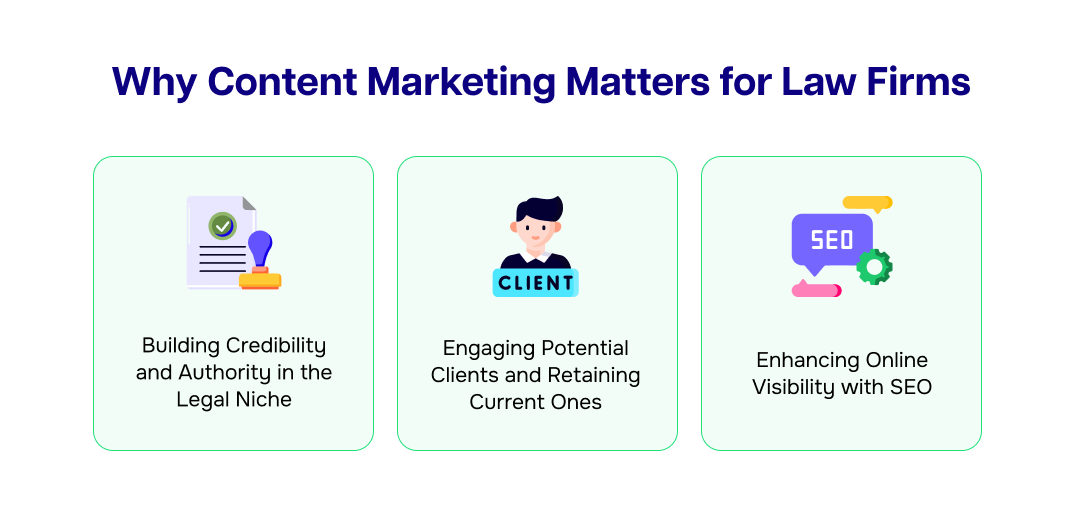
Building Credibility and Authority in the Legal Niche
When you create helpful content, it shows that you know your stuff. It’s like being a reliable friend who always has good advice. By sharing valuable information, you establish yourself as an expert in the legal field. People are more likely to trust and respect a firm that consistently provides valuable insights.
Engaging Potential Clients and Retaining Current Ones
Content marketing is like a conversation with your audience. You’re not just shouting out offers; you’re having a meaningful exchange. For potential clients, it’s a chance to get to know your firm and see if you’re the right fit for them. For current clients, it’s a way to stay connected and informed. This engagement builds strong, lasting relationships.
Enhancing Online Visibility with SEO Benefits for the Firm’s Website
Imagine your website is like a store on a busy street. Content marketing is like putting up eye-catching signs that draw people in. When you create quality content, search engines like Google or Microsoft Bing take notice. They see your website as a valuable resource and rank it higher in search results. This means more people can find your firm when looking for legal help.
Remember, content marketing isn’t just about selling a service. It’s about being a helpful resource, a trusted advisor, and a go-to expert in the legal world. That’s why it matters so much for law firms!
Key Components of an Effective Content Strategy for Law Firms
In crafting an effective content strategy for law firms, it’s essential to understand that content is more than just words on a page. It’s a powerful tool to connect with your audience, build trust, and showcase your expertise.
In this section, we’ll delve into the key components of a successful content strategy explicitly tailored for legal practices. From client-centric content to engaging blog posts and visual media, each element is crucial in establishing a solid online presence and fostering meaningful relationships with current and potential clients.
1. Client-Centric Content
To create content that truly resonates, it’s crucial to understand what clients are going through. What worries them? What questions do they have about legal matters? Tailoring your content to address these needs shows you’re genuinely attuned to your client’s concerns.
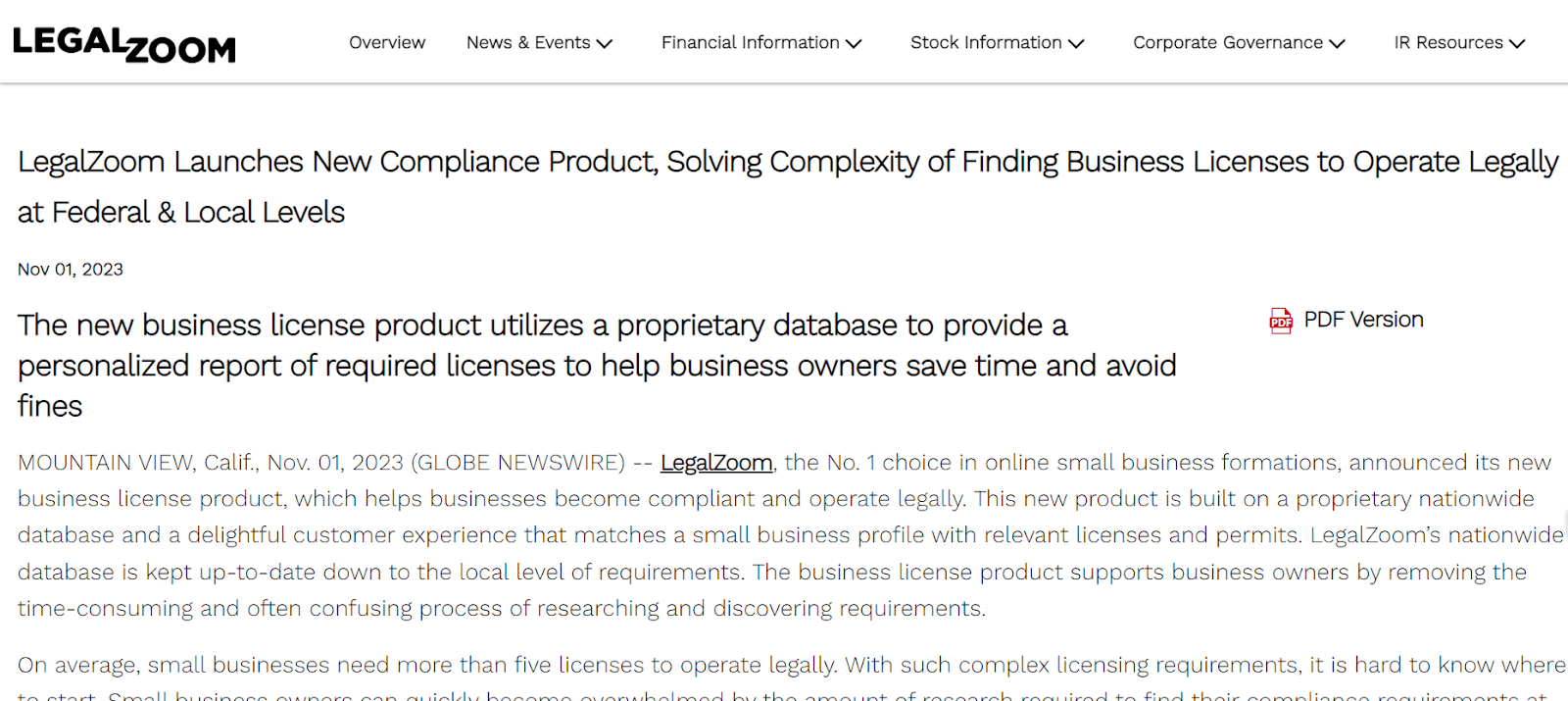
LegalZoom, a well-known online legal services company, provides a range of articles and guides on its website addressing common legal concerns and questions. For instance, they offer articles on topics like creating a will or forming a business, catering to their audience’s specific needs.
2. Educational Blog Posts
Blog posts are like little classrooms where you can showcase your expertise. They allow you to dive deep into legal topics, providing insightful information to potential clients. Choosing relevant subjects that matter to your audience is key.
For example, Avvo, a legal advice and lawyer directory platform, features a blog that covers various legal topics. They have informative articles on subjects like divorce, personal injury claims, and estate planning. These articles establish their authority in the legal field and offer valuable information to potential clients.
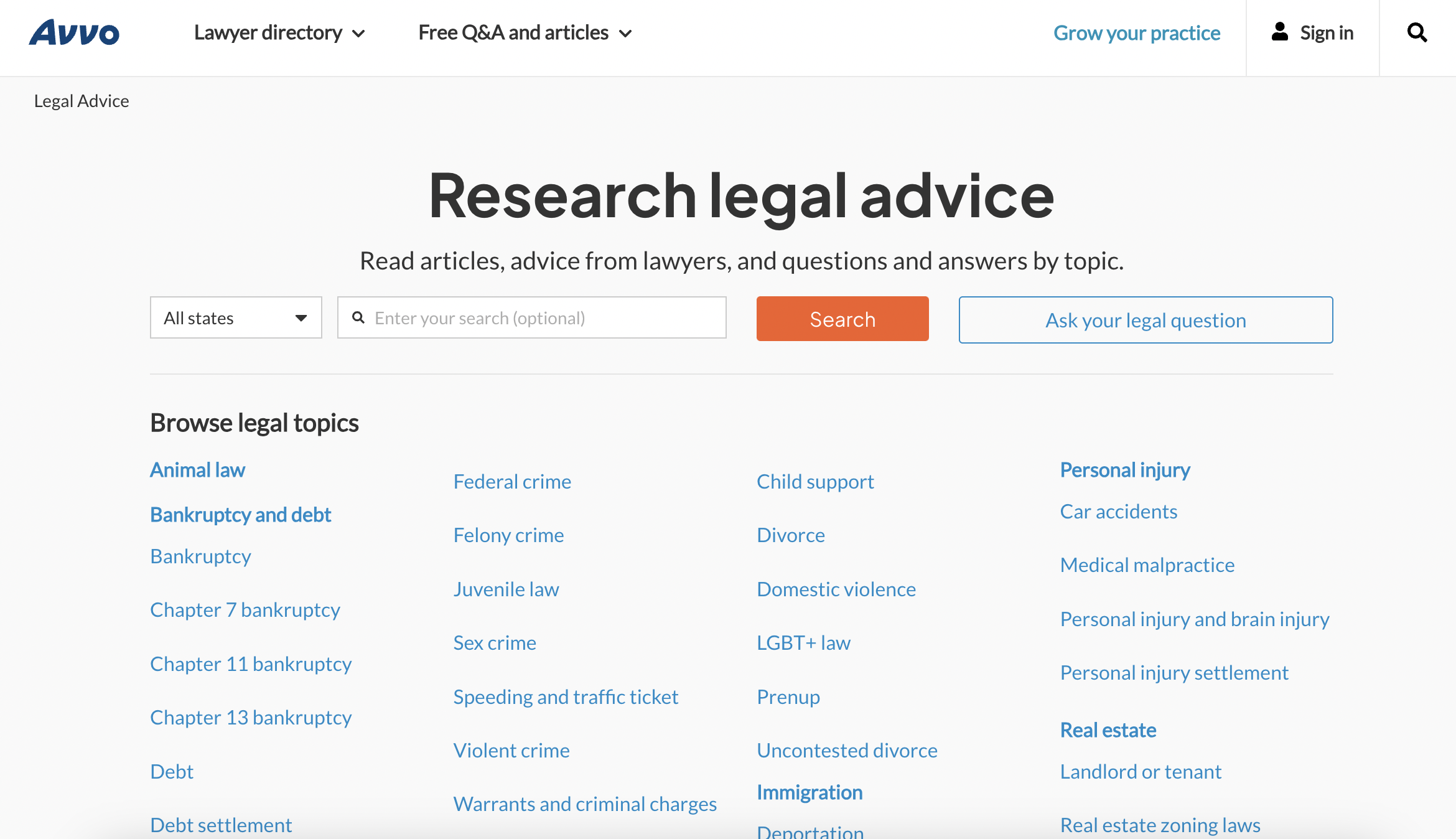
3. Videos and Webinars
Visual content is a powerful way to connect with your audience on a more personal level. Videos and webinars humanize your firm, putting faces to the names. Hosting webinars to discuss legal changes or offer advice is a fantastic way to engage with potential clients.

LegalSifter, a company specializing in contract review technology, hosts webinars to educate their audience about contract-related topics. These webinars not only serve as a platform to discuss legal changes but also allow them to showcase their expertise in contract law.
4. Case Studies and Testimonials
Showcasing past successes is like displaying a trophy case of your firm’s achievements. Case studies and testimonials provide concrete evidence of your abilities. It’s essential to present these in a way that highlights client satisfaction without breaching confidentiality.
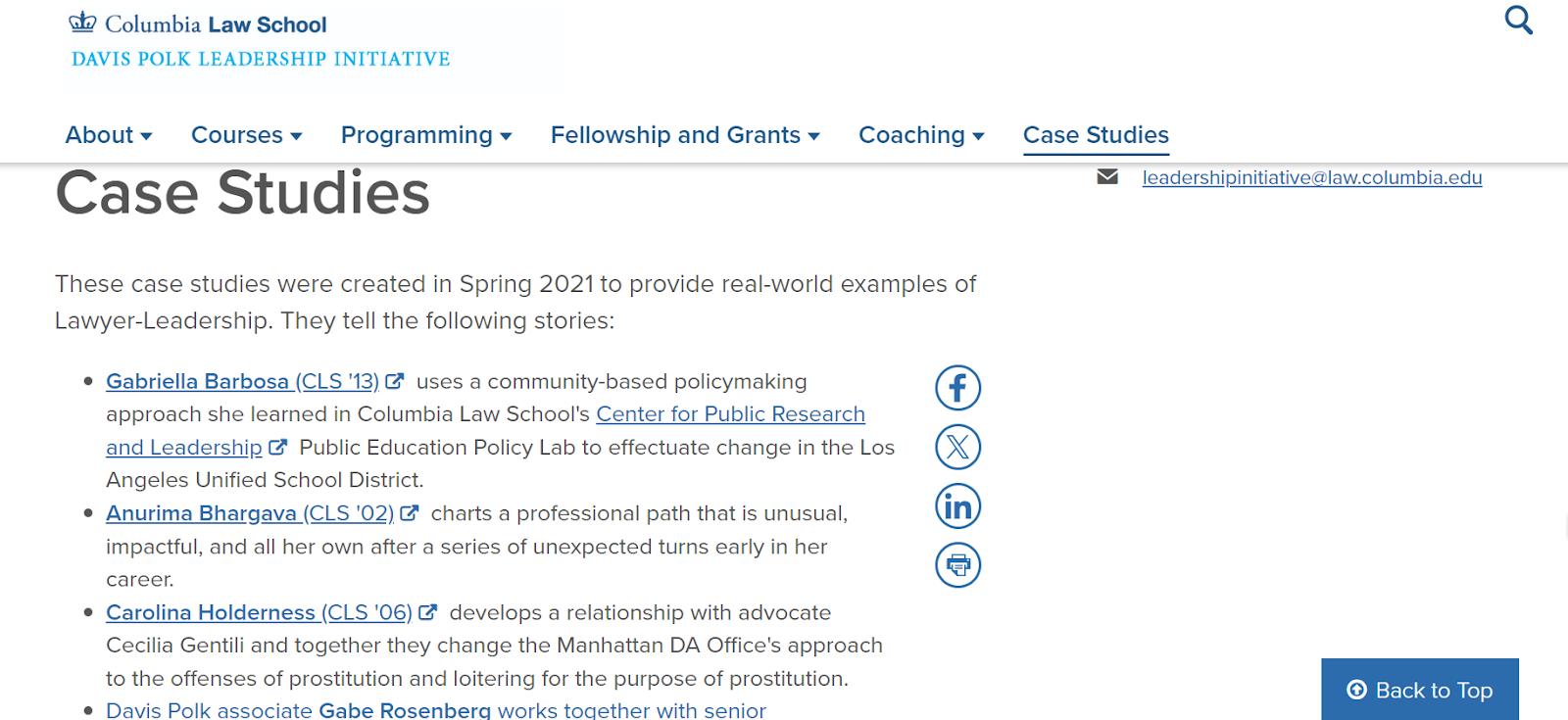
Davis Polk, a prominent international law firm, showcases case studies on their website to highlight their successes in various legal matters. These case studies provide concrete examples of their past achievements, instilling confidence in potential clients.
5. Newsletters and Email Campaigns
Showcasing past successes is like displaying a trophy case of your firm’s achievements. Case studies and testimonials provide concrete evidence of your abilities. It’s essential to present these in a way that highlights client satisfaction without breaching confidentiality.
For instance, Baker McKenzie, one of the largest and most prestigious law firms in the world, regularly sends out newsletters to their subscribers. These newsletters often contain updates on legal trends, recent cases, and industry insights, demonstrating their commitment to consistent communication and providing valuable content tailored to their audience’s interests.

Measuring the Success of Your Content Marketing Strategy
Understanding how well your content is performing is essential for any successful content marketing strategy. It’s like having a compass that guides you toward achieving your goals. So, let’s explore the key steps to measure the effectiveness of your content marketing efforts for law firms.
1. Key Performance Indicators (KPIs) Relevant to Law Firms
Tracking how well your content performs is like having a compass guiding you in the right direction. For law firms, important KPIs might include:
- The number of visitors to your website.
- How long do visitors stay on your site?
- Which pages do they visit most?
- The number of inquiries or calls received.
Google Analytics and HubSpot are tools that can help track these KPIs. They give you data on website traffic, visitor behavior, and conversion rates.
Additionally, keeping an eye on how many potential clients reach out to you through contact forms or calls can tell you if your content is resonating.
2. Tools and Platforms for Tracking Engagement and Conversions
Think of these tools as your trusty assistants. They help you keep tabs on how people interact with your content.
- Google Analytics: Provides insights into website traffic and user behavior.
- HubSpot: Offers robust analytics and helps manage customer relationships.
- CRM software (Customer Relationship Management): Helps track and manage client interactions and inquiries.
Sasha Berson, Law Firm Growth Expert at Grow Law Firm, says that Google remains the most important channel for law firms to focus on:
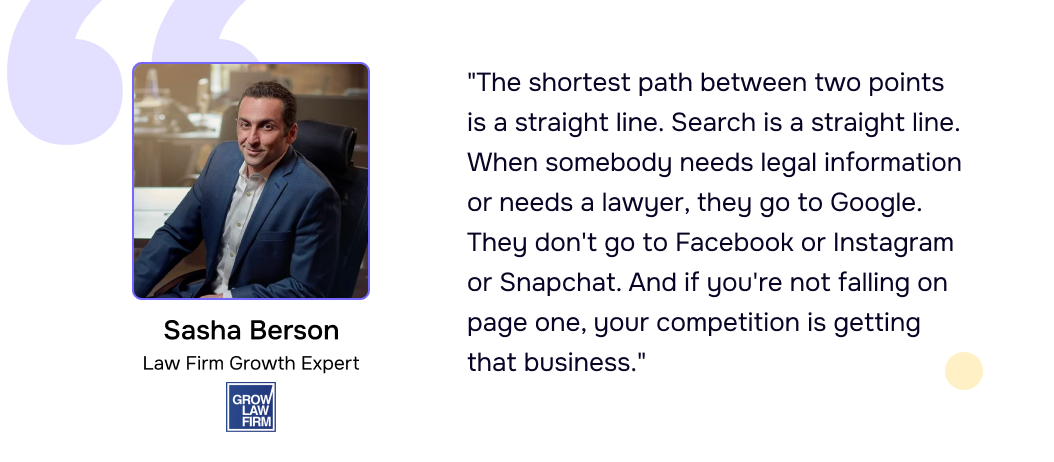
3. Adjusting Your Strategy Based on Data-Driven Insights
Data-driven insights are like your content’s secret weapon. They help you make your content strategy even better. If you notice that certain content is viral or that visitors from social media are more engaged, you can use this information to adjust your strategy.
For example, If you see that blog posts about family law are getting a lot of attention on your website, you might decide to create more content in that area to serve your audience better.
Challenges in Legal Content Marketing and Overcoming Them
Navigating the complexities of legal communication while adhering to ethical guidelines and industry regulations can be demanding. Striking the right balance between informative and promotional content can also present a unique set of hurdles.
By addressing these obstacles head-on, law firms can enhance their online presence and effectively connect with their target audience. That being said, let’s dive deeper into them:
1. Ensuring Content Accuracy and Avoiding Misrepresentation
The information you share must be accurate and reliable. Misleading content can erode trust. Double-checking facts and citing reputable sources helps maintain credibility.
For example, if you’re writing about recent changes in tax law, you’d want to verify the details with official government sources.
2. Striking the Balance Between Promotional and Informative Content
Nobody likes a pushy sales pitch, especially when it comes to legal matters. It’s important to find the right balance between showcasing your services and providing genuinely helpful information.
A good approach might be to offer actionable advice in your content, demonstrating your expertise while subtly highlighting how your firm can assist.
3. Adhering to Ethical Guidelines and Industry Regulations
The legal field has its own set of rules and regulations, and these apply to content marketing, too. It’s crucial to ensure that your content doesn’t inadvertently breach any ethical guidelines or violate industry standards.
For instance, you’d want to avoid making promises or guarantees about outcomes, which can be misleading and potentially unethical.

Best Practices and Tips for Law Firms
Here are some of the best practices and actionable tips tailored specifically for law firms.
1. Consistency is Key: Publishing Regular, High-Quality Content
Just like in any relationship, consistency builds trust. Regularly sharing valuable content shows that you’re committed to helping your audience. It also keeps your firm fresh in their minds. For instance, if you commit to posting a new blog every week, stick to it. Your audience will come to rely on that reliable source of information.
2. Collaborating With Legal Influencers and Guest Authors
Joining forces with others in the legal community can expand your reach and bring fresh perspectives. Working with influencers or inviting guest authors to contribute to your content can bring new insights and credibility to your firm.
For instance, partner with a well-known legal expert for a joint webinar or have a guest attorney write a guest post for your blog.
3. Using Social Media to Amplify Your Content’s Reach
Social media is like a megaphone for your content. It’s where you can share insights, engage with your audience, and extend your firm’s reach beyond your website. Choose the platforms that resonate most with your target audience.
For example, if you’re specializing in employment law, LinkedIn might be a pivotal platform to share updates on labor laws and workplace regulations.
4. Prioritizing Mobile Optimization For All Content
With so many people using smartphones, it’s crucial that your content looks great and is easy to read on mobile devices. Ensuring your website and content are mobile-friendly helps you reach a wider audience.
Imagine a potential client searching for legal advice on their phone — you want them to have a seamless and enjoyable experience on your site.
Conclusion
Content marketing is more than just a marketing tool; it’s a way to connect with your audience on a meaningful level. By providing valuable information and establishing trust, law firms can build strong relationships with clients, ultimately leading to better outcomes for both parties.
Remember, it’s not just about the legal expertise you offer but also about how you communicate and connect with those seeking your services.
If you’re seeking expert help in content writing services for your law firm, Pepper Content is here to assist you with everything, from understanding your target audience to crafting content tailored to your requirements. We’re your one-stop shop for all things content!
Book a demo now!
Latest Blogs
Explore how Google’s 2025 AI search updates triggered ranking chaos. Learn actionable strategies to adapt your SEO for AI Overviews, zero-click searches, and SERP volatility. Stay ahead now.
Learn how to rank on AI search engines like ChatGPT, Perplexity, and Gemini by optimizing your content for authority, structure, and relevance. Stay ahead in AI-driven search with this strategic guide.
Explore the best healthcare SEO services for your medical practice. Improve online visibility and effectively reach more patients in need of your services.
Get your hands on the latest news!
Similar Posts

Content Strategy
5 mins read
Choosing The Best Healthcare Marketing Agency For Effective Content Solutions

Content Marketing
4 mins read
Top 10 Agencies B2B SaaS Content Marketing for B2B Success

B2C Marketing
5 mins read